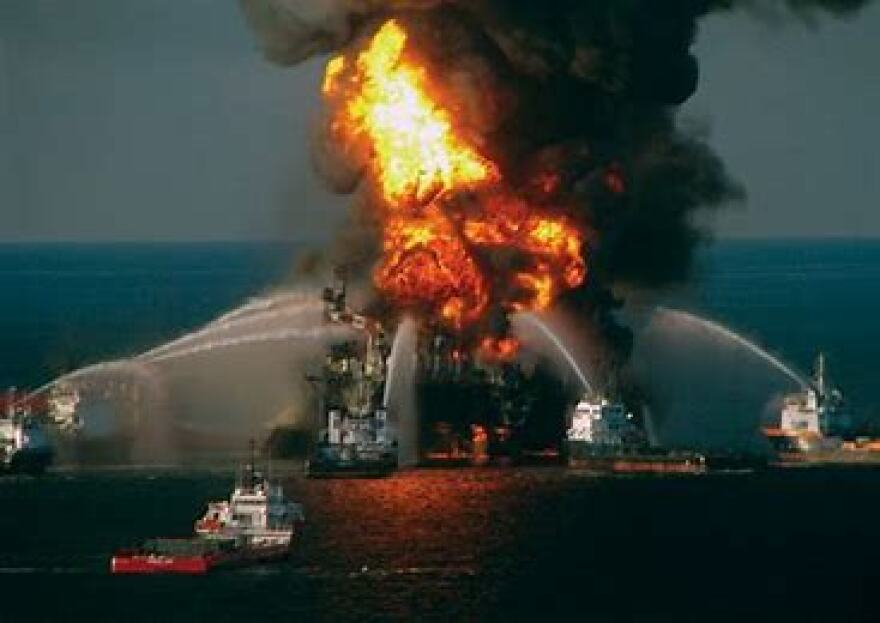As oil from the shattered Deepwater Horizon gushed into the Gulf of Mexico, President Barack Obama wrapped up his fourth trip to the region with a stop aboard NAS Pensacola ten years ago Monday.
“Yes, this is an unprecedented environmental disaster; it’s the worst in our nation’s history,” said the President. “But we’re continuing to meet it with an unpreceded federal response and recovery effort. This is an assault on our shores, and we’re going to fight back with everything that we’ve got.”
After stops in Gulfport, Mississippi and Theodore, Alabama, the president spoke at the Naval Air Technical Training Center on June 15.
“Assessing the situation, reviewing the response, seeing what needs to be done better and faster,” Obama said. “And talking with folks, whether fishermen or small-business people and their families, who are seeing their lives turned upside-down by this disaster.”
Before coming to NAS, Obama spent the earlier part of the morning on a tour of Pensacola Beach with local officials. In his 21-minute speech, he reiterated his promise to hold BP accountable for all spill-related damages.
“Let me say to the people of Pensacola and to the Gulf Coast; I am with you, my administration is with you for the long haul to make sure BP pays for the damage it has done, and to make sure that you are getting the help you need to protect this beautiful coast,” said the president. “And to rehabilitate the damaged areas; to revitalize this region, and to make sure that nothing like this ever happens again.”
Deepwater Horizon was an environmental disaster, but it also proved to be an economic one for businesses along the Gulf Coast.
“Here in Pensacola and the Panhandle, tourism is everything; and when the tourists stay home, it ripples out and hits folks across these communities,” Obama told the audience. “The charter boats, the hotels, the restaurants, the roadside stores, the shops, the suppliers, the dive shops. And if your inland waters are contaminated, it could be devastating – changing the way of life down here for years to come.”
The president also spoke of increasing the military’s involvement in the crisis. About 17,500 National Guard troops were authorized in response to the spill. And he praised those with boots already on the ground.
“There are soldiers on the beaches, putting out sandbags and building barriers and cleaning up the oil,” Obama said. “There are sailors and Marines offering their ships and their skimmers and their helicopters and miles of boom. They’re airmen overhead, flying in equipment and spraying dispersant. And of course, there are Coast Guardsmen and women – on the cutters, in the air – working around the clock.”
The response, said the president, was unpresented. More than 5,000 vessels; dozens of aircraft and 27,000 personnel on-scene. And he reiterated that his administration would do whatever it took to deal with the disaster.
“And that includes the additional actions I announced, to make sure that seafood from the Gulf is safe to eat,” Obama said. “It includes steps we’ve taken to protect the safety of workers involved in the cleanup; It includes a new command structure I announced this morning to make sure states and local communities, like Pensacola, have the autonomy and the resources to go forward.”

Local reaction to the speech was mixed. Pensacola Mayor Mike Wiggins – who accompanied the president on his beach tour — called it “spot on” in addressing the crisis.
“It was 2-for-1; it addressed the crisis we’re facing here in Pensacola, but also honored the troops,” said Wiggins. “I just thought it was a terrific speech. And I just want to thank the President for coming to Pensacola and saying those inspiring words.”
But Escambia County Commissioner Gene Valentino said the President focused too much on military matters and not enough on helping local residents with spill-related problems.
“We’ve got a bunch of vessels of opportunity in the Gulf; the reconverted shrimp boats that are dragging skimmer and booms behind them,” said Valentino. “That’s fine, but the real problem is we need the world-class vessels to ‘kick butt’ to quote the president, to really get on it.”
Two years later, President Obama signed into law the RESTORE Act, which provides reimbursement to those impacted by the oil spill, from settlement of a lawsuit against BP.

